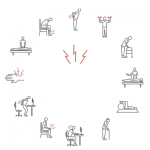“Given how many people are killed by prescription opioids and how dangerous these drugs are, it should be no less important for a clinician to check a prescription drug-monitoring program before prescribing an opioid than to check kidney function before prescribing a new blood-pressure medicine,” Alexander says.
In March, the CDC released guidelines instructing primary care doctors to sharply curtail use of opioids for chronic pain. At the time, CDC Director Dr. Tom Frieden called the prescription overdose epidemic “doctor-driven.”
Primary-care doctors treating adults for chronic pain write nearly half of opioid prescriptions, the CDC said. The new guidelines recommend non-opioids like acetaminophen and ibuprofen as the first line of pain treatment.
Authors of the current study say American clinicians are writing enough prescriptions to medicate every U.S. adult for a month.
“No opioid is entirely safe,” Alexander says, “and all opioids should be used with much greater caution than we have in the past two decades.”


